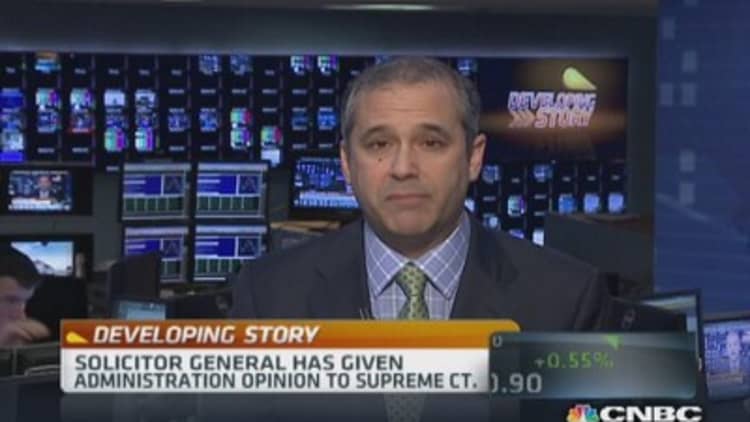
The Obama administration is siding with big banks in a dispute over their alleged role in the Bernard Madoff Ponzi scheme.
Solicitor General Donald Verrilli Jr., in a 22-page filing late Friday, urged the Supreme Court to let stand a lower court ruling that would bar Madoff Trustee Irving Picard from pursuing billions of dollars in claims against the likes of HSBC, UBS and Italy's UniCredit, which Picard alleges helped enable the scam to take place.
Picard had also sued Madoff's primary banker, JPMorgan Chase, seeking some $19 billion in damages. Earlier this year, Chase agreed to pay $543 million to settle the case, but the appeals involving the remaining banks have continued. The banks have denied wrongdoing, and argue that Picard has no standing to sue them on behalf of Madoff's clients.
On the latter point, the administration agrees.
"Customers are entitled to bring—and have already brought—their own suits against respondents for allegedly facilitating Madoff's fraud," according to the filing. "If (Picard) were permitted to pursue the same claims while standing in the customers' shoes, that could raise complicated problems."
Legally,the banks have argued, Picard represents what is left of the Madoff firm—not the firm's customers. Allowing Picard to sue on their behalf is a duplication of efforts, the argument goes; and it theoretically could allow a future scam artist to sue those who were cheated.
The Supreme Court, which has not yet decided whether to hear the case, had asked the administration to weigh in.
In a statement, Picard spokeswoman Amanda Remus said Picard and his chief counsel, David Sheehan, "respectfully disagree" with the solicitor general's arguments. Remus said Picard and Sheehan are looking to the high court to review the lower court rulings denying their ability to pursue "billions of dollars in damages from the international financial institutions that facilitated Madoff's fraud."
Read MoreFinancial fraud in 25 years: A virtual Madoff at lightning speed
In addition to the Madoff case, the justices are considering whether to hear a similar case brought by the court-appointed receiver in the $7 billion Allen Stanford Ponzi scheme. Ralph Janvey has sued hundreds of former Stanford employees and other third parties, attempting to claw back alleged proceeds of the scam.
Janvey and Picard argue their rights to sue are in question because lower courts have issued conflicting rulings.
The Supreme Court's decision—including whether to hear the cases at all—could help shape the recovery efforts in future investment frauds.
Read MoreNew payout could make more Madoff victims whole
—By CNBC's Scott Cohn.


